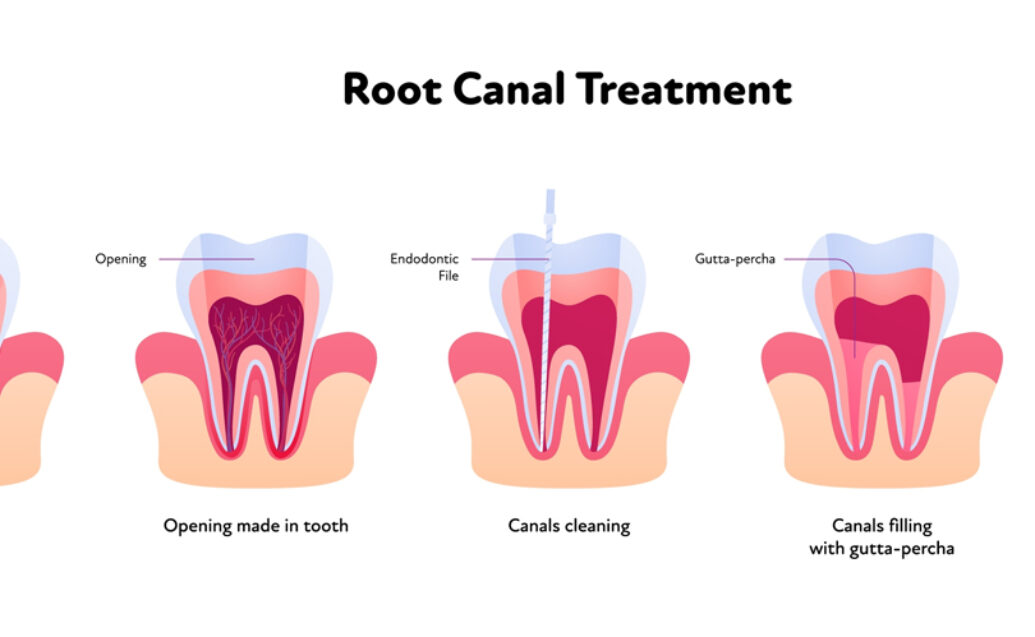Root-canal therapy is designed to eliminate bacteria from the infected root canal, prevent reinfection of the tooth and save the natural tooth.
When one undergoes a root canal, the inflamed or infected pulp is removed and the inside of the tooth is carefully cleaned and disinfected, then filled and sealed. Root-canal therapy can preserve teeth that would otherwise be extracted.
Myth #1: Root canals hurt … right?
About two-thirds of people cite fear of pain as the major concern relating to a root canal. However, the pain they feel is caused by an infection in the tooth, not by root canal treatment. A root canal is done to eliminate that pain and with modern techniques for local anaesthesia, this procedure is mostly painless, similar to what you would feel with a dental filling. Additionally, dentists have expertise in managing any tooth discomfort and can generally mitigate any pain or discomfort swiftly in order to try to maintain a positive treatment journey.
Myth #2: I can’t have a root canal when I have an infection.
Actually, when you are experiencing pain from an infected tooth, it is appropriate to have a root canal. The root canal will often relieve the pain you are experiencing from the infected tooth. Root canal treatment is necessary when damage to the tooth has penetrated the outer layers of enamel and the pulp of a tooth (which includes nerves) has become inflamed or infected. Left untreated, the infection will only get worse, which we unfortunately see a lot, our advice treat this pain earlier rather than later!
Myth #3: Pulling a tooth is better than a root canal.
There is no perfect replacement for a natural tooth. If possible, saving your natural tooth rather than extracting it is a sounder solution, however the dentist may make alternative suggestions depending on the varying factors involved. A tooth that has undergone a root canal treatment can still last a lifetime and delivers optimal performance and appearance. Replacing an extracted tooth with a bridge or implant (while highly successful), requires more time in treatment and may result in further procedures to neighbouring teeth and supporting tissue so don’t dismiss root canals.
Myth #4: Root canals require multiple long appointments.
With modern techniques, most root canals can be performed in a single visit of 90 to 120 minutes. While some root canals do require two appointments, this occurs in specific cases based on the type and severity of the infection present. To improve efficiency for patients and minimize the need for multiple visits, we have added the latest technology and equipment to our practice to further enhance patient experience.
Myth #5: A root canal removes the roots of the tooth.
When a root canal is performed, the dentist will remove the infected or inflamed tissue within the crown and inside the roots, called the pulp, along with the tooth’s nerve. The roots themselves are left in place. Because they anchor your teeth to your jawbone, it is important to leave the roots intact wherever possible.
Myth #6: I don’t need a root canal because I don’t have a toothache.
Teeth that need root canals do not always cause pain. Sometimes, teeth are infected and the body has created ways to deal with the pain. Your dentist can detect when a root canal is needed, either before teeth become painful, or when a non-painful, yet chronic infection is present. That is why is very important to visit your dentist for your routine check-ups and why at Olive Tree Dental we take preventative dentistry very seriously. We want happy teeth and happy patients!

Procedure
Your dentist will determine if you need a root canal by taking an x-ray of the affected tooth.
The first step is the administration of a local anaesthetic or sedative. This ensures that you will not feel any pain or discomfort..
Next, the infected tooth is isolated using a dental rubber dam. This prevents saliva or debris from contaminating the surgery location..
Your dentist, with the help of the drill, removes the decay, along with the infected pulp inside the tooth..
The roots of your tooth are cleaned and shaped. Most of the times, the root channel is also permanently filled and sealed at this time. After this, the tooth will be ready to have a permanent filling placed or a crown (your dentist will advise you).
Post-Procedure
Some soreness and pain are normal as the anaesthetic wears off. Your dentist may prescribe a painkiller, or you may opt for over-the-counter pain medicine. If the infection reaches the root of your tooth, then you may need to take antibiotics.
You will likely experience numbness for 2-4 hours after your procedure. We don’t recommend eating until the numbness is completely gone. Remember to stick to your good oral hygiene habits! You should brush your teeth twice a day and floss once daily and book regular hygiene appointments at least 2-3 times a year, if you haven’t tried our EMS Airflow GBT. method we highly recommend you do, it’s a game-changer when it comes to hygiene.
Author:
Dr Alia Abdouni
(GDP with special interest in endodontics)

Meet our partners in digital dentistry